厦门大学2005年-2012年考博英语真题及答案解析
2005医学博士英语真题及答案
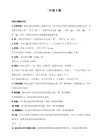
Part II vocabulary
section A
31.There was no_____but to close the road until February.
A.dilemma B.denying C.alternative D.doubt
50.He was given a laptop computer in acknowledgement of his work for the company.
A.accomplishment B.recognition C.apprehension mitment
Part III Close
A.abolish B.address C.extinguish D.encounter
48.This report would be intelligible only to an expert in computing.
A.intelligent prehensive petent prehensible
Mr.Allen does’t only introduce his students to major problems 55 in marriage such as illness or unemployment.He also expose them to nitty-gritty problems they will face every day.He wants to introduce young people to all the trials and 56 that can strain a marriage to the breaking point .He even 57 his students with the problems of divorced men must pay child support money for their wives.
厦门大学博士考试英语真题2010年

厦门大学博士考试英语真题2010年(总分:100.00,做题时间:180分钟)一、Part Ⅰ Vocabulary and Structure (总题数:30,分数:30.00)1.The discussion was so prolonged and exhausting that ______ the speakers stopped for refreshments. (分数:1.00)A.at largeB.at intervals √C.at caseD.at random解析:at large“自由行动,逍遥自在地”;at intervals“不时,时时”;at case“不紧张,自由自在”;at random“随便,随机的,随意的”。
根据句意和各个选项的意思可知,正确答案是B。
2.When traveling, you are advised to take traveler's checks, which provide a secure ______ to carrying your money in cash.(分数:1.00)A.substituteB.selectionC.preferenceD.alternative √解析:substitute“代替,代替物”;selection“选择”,指从相当数量中进行选择,强调数量多和慎重的判断和鉴别;preference“喜欢,偏爱”,强调选择时个人的偏爱;alternative “两者或两者以上挑一,取舍,抉择”。
根据句意和各个选项的意思可知,正确答案是D。
3.I never trusted him because I always thought of him as such a ______ character.(分数:1.00)A.graciousB.suspicious √C.uniqueD.particular解析:gracious“有礼貌的,宽厚的”;suspicious“多疑的,可疑的”;unique“独一无二的,唯一的”;particular“特别的,独有的”。
考博英语(词汇)历年真题试卷汇编6(题后含答案及解析)
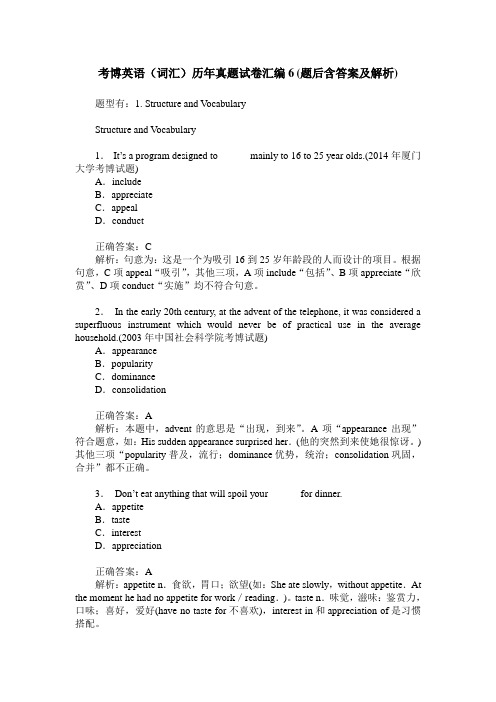
考博英语(词汇)历年真题试卷汇编6(题后含答案及解析)题型有:1. Structure and V ocabularyStructure and V ocabulary1.It’s a program designed to______ mainly to 16 to 25 year olds.(2014年厦门大学考博试题)A.includeB.appreciateC.appealD.conduct正确答案:C解析:句意为:这是一个为吸引16到25岁年龄段的人而设计的项目。
根据句意,C项appeal“吸引”,其他三项,A项include“包括”、B项appreciate“欣赏”、D项conduct“实施”均不符合句意。
2.In the early 20th century, at the advent of the telephone, it was considered a superfluous instrument which would never be of practical use in the average household.(2003年中国社会科学院考博试题)A.appearanceB.popularityC.dominanceD.consolidation正确答案:A解析:本题中,advent的意思是“出现,到来”。
A项“appearance出现”符合题意,如:His sudden appearance surprised her.(他的突然到来使她很惊讶。
)其他三项“popularity普及,流行;dominance优势,统治;consolidation巩固,合并”都不正确。
3.Don’t eat anything that will spoil your______ for dinner.A.appetiteB.tasteC.interestD.appreciation正确答案:A解析:appetite n.食欲,胃口;欲望(如:She ate slowly,without appetite.At the moment he had no appetite for work/reading.)。
2005年中国科学院考博英语真题试卷(题后含答案及解析)
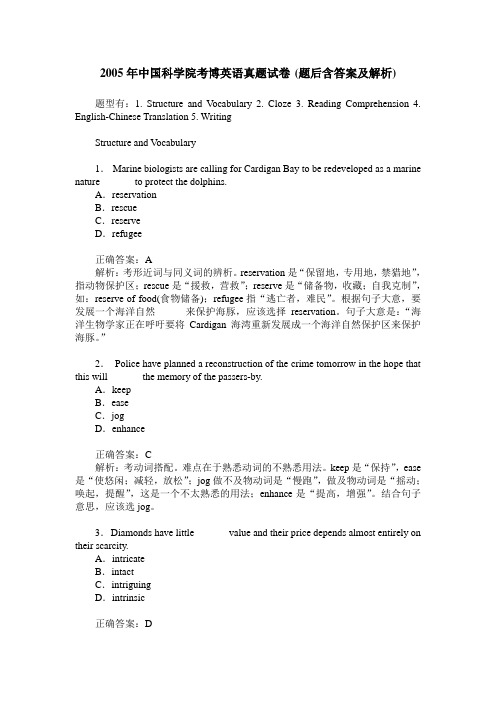
2005年中国科学院考博英语真题试卷(题后含答案及解析)题型有:1. Structure and V ocabulary 2. Cloze 3. Reading Comprehension 4. English-Chinese Translation 5. WritingStructure and V ocabulary1.Marine biologists are calling for Cardigan Bay to be redeveloped as a marine nature ______ to protect the dolphins.A.reservationB.rescueC.reserveD.refugee正确答案:A解析:考形近词与同义词的辨析。
reservation是“保留地,专用地,禁猎地”,指动物保护区;rescue是“援救,营救”;reserve是“储备物,收藏;自我克制”,如:reserve of food(食物储备);refugee指“逃亡者,难民”。
根据句子大意,要发展一个海洋自然______来保护海豚,应该选择reservation。
句子大意是:“海洋生物学家正在呼吁要将Cardigan海湾重新发展成一个海洋自然保护区来保护海豚。
”2.Police have planned a reconstruction of the crime tomorrow in the hope that this will ______ the memory of the passers-by.A.keepB.easeC.jogD.enhance正确答案:C解析:考动词搭配。
难点在于熟悉动词的不熟悉用法。
keep是“保持”,ease 是“使悠闲;减轻,放松”;jog做不及物动词是“慢跑”,做及物动词是“摇动;唤起,提醒”,这是一个不太熟悉的用法;enhance是“提高,增强”。
2012年厦门大学考博英语真题试卷(题后含答案及解析)
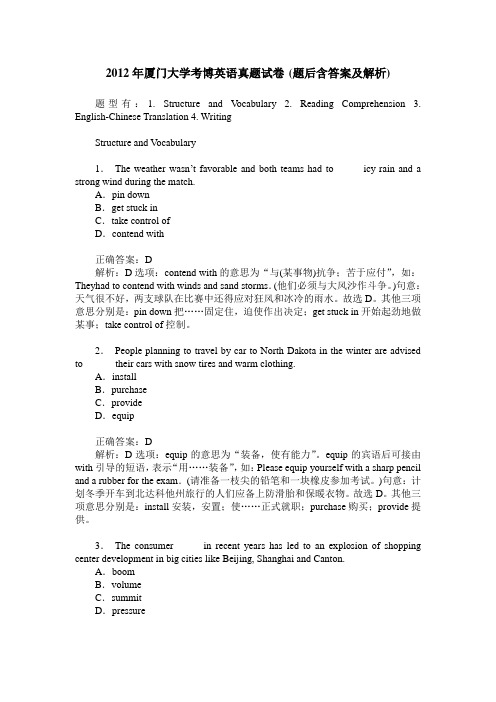
2012年厦门大学考博英语真题试卷(题后含答案及解析)题型有:1. Structure and V ocabulary 2. Reading Comprehension 3. English-Chinese Translation 4. WritingStructure and V ocabulary1.The weather wasn’t favorable and both teams had to______icy rain and a strong wind during the match.A.pin downB.get stuck inC.take control ofD.contend with正确答案:D解析:D选项:contend with的意思为“与(某事物)抗争;苦于应付”,如:Theyhad to contend with winds and sand storms.(他们必须与大风沙作斗争。
)句意:天气很不好,两支球队在比赛中还得应对狂风和冰冷的雨水。
故选D。
其他三项意思分别是:pin down把……固定住,迫使作出决定;get stuck in开始起劲地做某事;take control of控制。
2.People planning to travel by car to North Dakota in the winter are advised to______ their cars with snow tires and warm clothing.A.installB.purchaseC.provideD.equip正确答案:D解析:D选项:equip的意思为“装备,使有能力”。
equip的宾语后可接由with引导的短语,表示“用……装备”,如:Please equip yourself with a sharp pencil and a rubber for the exam.(请准备一枝尖的铅笔和一块橡皮参加考试。
2005年03月考博英语试题及答案
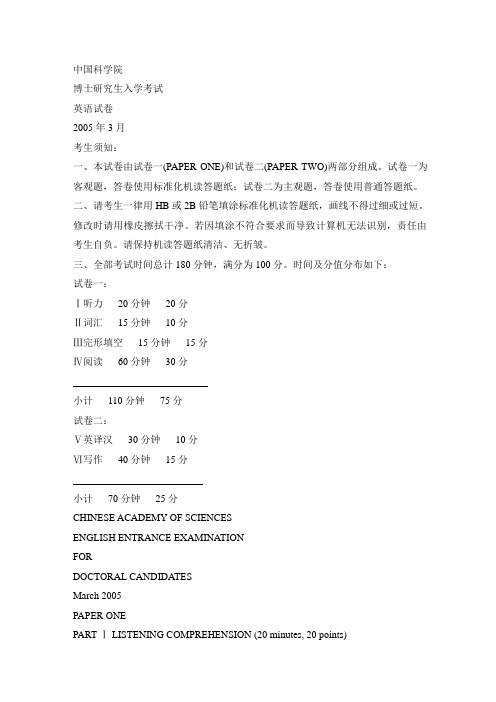
中国科学院博士研究生入学考试英语试卷2005年3月考生须知:一、本试卷由试卷一(PAPER ONE)和试卷二(PAPER TWO)两部分组成。
试卷一为客观题,答卷使用标准化机读答题纸;试卷二为主观题,答卷使用普通答题纸。
二、请考生一律用HB或2B铅笔填涂标准化机读答题纸,画线不得过细或过短。
修改时请用橡皮擦拭干净。
若因填涂不符合要求而导致计算机无法识别,责任由考生自负。
请保持机读答题纸清洁、无折皱。
三、全部考试时间总计180分钟,满分为100分。
时间及分值分布如下:试卷一:Ⅰ听力20分钟20分Ⅱ词汇15分钟10分Ⅲ完形填空15分钟15分Ⅳ阅读60分钟30分小计110分钟75分试卷二:Ⅴ英译汉30分钟10分Ⅵ写作40分钟15分小计70分钟25分CHINESE ACADEMY OF SCIENCESENGLISH ENTRANCE EXAMINATIONFORDOCTORAL CANDIDATESMarch 2005PAPER ONEPART Ⅰ LISTENING COMPREHENSION (20 minutes, 20 points)Directions:In this section, you will hear ten short conversations between two speakers. At the end of each conversation, a question will be asked about what was said. The question will be spoken only once. Choose the best answer from the four choices given by marking the corresponding letter with a single bar across the square brackets on your Machine-scoring Answer Sheet.1. A. He needs more fresh air. B. He is willing to go out.C. He is too sick to go out.D. He opened the window.2. A. Their friemts. B. Daily activities.C. Past experiences.D. Historical events.3. A. To buy a ticket. B. To pay a fee.C. To pay back a debt.D. To buy a gift.4. A. Give information. B. State preferences.C. Ask permission.D. Attract attention.5. A. In a gymnasium. B. In an art exhibition.C. In a shop.D. In a hotel.6. A. 19 dollars each. B. 38 dollars each.C. 30 dollars altogether.D. 36 dollars altogether.7. A. Jack is a gentleman. B. Jack does everything right.C. Jack is a desirable husband.D. Jack behaves immaturely sometimes.8. A. It was remarkable to both the man and the woman.B. It was not suitable for the woman.C. The man hated this kind of movie.D. The woman complained about its quality.9. A. See how much the jacket is.B. See if the jacket there is blue.C. See if there is a cell phone in the jacket.D. See if there was anything turned in this morning.10. A. The man has caught a cold. B. The woman was caught in a rainstorm.C. The weather forecast was inaccurate.D. It rained very heavily.Directions:In this section, you will hear three short talks. At the end of each talk, there will be a few questions. Both the talk and the questions will be read to you only once. After each question, there will be a pause. During the pause, you must choose the best answer fromthe four choices given by marking the corresponding letter with a single bar across the square brackets on your Machine-scoring Answer Sheet.Questions 11-13 are based on Talk 1.11. A. Language comes from physical labor.B. Language learning is a long-term endeavor.C. Language reflects history.D. Language study is very important.12. A. Constructing a wheel. B. Making a choice.C. Coming back.D. Turning around.13. A. The overthrow of a class. B. The overthrow of a tyrant.C. The overthrow of a belief.D. The overthrow of an act.Questions 14-17 are based on Talk 2.14. A. It‟s a wonderful idea.B. It‟s not a smart thing to do.C. It‟s too difficult to put into practice.D. It‟s interesting to the decision maker.15. A. Telling people about your degrees.B. Promising that you will make good achievements.C. Introducing your job responsibilities.D. Talking about the needs of the potential employer.16. A. The results which your potential boss wants to gain with your assistance.B. The results of making more money on an international market.C. The results that the employer has seen in the past.D. The results that your potential boss does not want to see.17. A. Proving that you are capable of doing the job.B. Seeking the position that is not too high or too low for you.C. Insisting that experience is more important than knowledge.D. Claiming that you are better than any other applicant.Questions 18-20 are based on Talk 3.18. A. They exercise dogs twice a day.B. They learn how to be responsible for dogs.C. They encourage dogs to go for long walks.D. They like dogs too much to care about other things.19. A. Working for the police.B. Relaxing with other dogs.C. Protecting businesses.D. Guiding the blind.20. A. Dogs ride in public transport.B. Dogs bite their owners when in a rage.C. Vehicles run over stray dogs.D. People always keep dogs on leads.PART ⅡVOCABULARY (15 minutes, 10 points, 0.5 point each)Directions: Choose the word or expression below each sentence that best completes the statement, and mark the corresponding letter of your choice with a single bar across the square brackets on your Machine-scoring Answer Sheet.21. Giorgio, now fifteen, and Lucia, also in her teens, were reaching the of their adolescence.A. crisisB. criterionC. causalityD. credibility22. At first Jackie prayed, frozen in fear, but gradually his terror curiosity.A. put up withB. lived up toC. did away withD. gave way to23. The International Olympic Committee rejects the accusations that Beijing‟s budget-cutting move might its preparation for the games.A. degradeB. deliberateC. deployD. defend24. You are not allowed to take a second job your employer gives you permission.A. so long asB. otherwiseC. unlessD. whereas25. They continued to about and enjoy themselves until they became tired.A. strokeB. strollC. stammerD. string26. The survey asked 750 school children about the values and beliefs they from television.A. pick upB. take upC. put upD. make up27. I am grateful for your invitation, and I‟d like to accept your offer with pleasure.A. delightedB. innocentC. graciousD. prestigious28. I must you farewell right now, but on some future occasion, I hope to see you again.A. relayB. bidC. sendD. deliver29. Perhaps my dishes will not be as delicious as those which you are accustomed to eating, but I beg you to grant my and have dinner with me.A. resentmentB. requirementC. requestD. reservation30. That singular ach ievement was not just about Korea‟s arrival as a football force but as a self-confident mature nation to be seriously.A. copedB. shownC. establishedD. taken31. Europe as a unit did little by itself; it either sent for US help, or each European government acted on its own.A. incidentalB. apparentC. cohesiveD. descendent32. On 9 December, James Joyce experienced one of those coincidences which affected him at the time and which later became material for his books.A. inadequatelyB. systematicallyC. profoundlyD. simultaneously33. Embarrassed, I nodded, trying to think of some way to my error.A. make do withB. make up forC. go in forD. go along with34. Furthermore, if I were to leave him, he would , for he cannot endure to be separated from me for more than one hour.A. prevailB. presideC. perishD. persecute35. With high hopes, the company sent samples of the substance to scientists, but theycouldn‟t any practical uses for it.A. come up withB. do justice toC. get even withD. look up to36. He signed a new contract with the Dublin firm, Maunsel & Company, on more favorable than those Grant Richards had given him.A. itemsB. termsC. articlesD. specifications37. Most scientists agree this outpouring contributes to global warming, which could eventually lead to coastal flooding, weather, and widespread crop loss.A. intensiveB. extremeC. unpleasedD. unique38. There was a quick turnover of staff in the department as the manager treated his employees with contempt.A. utterB. soleC. intimateD. corresponding39. The source, who spoke on condition of anonymity, to discuss the implication of that conclusion.A. recededB. impliedC. compliedD. declined40. Childhood can be a time of great insecurity and loneliness, during which the need to be accepted by peers great significance.A. takes onB. works outC. brings aboutD. gives inPART ⅢCLOZE TEST (is minutes, 15 points)Directions: There are 15 blanks in the following passage. Read the passage through. Then, go back and choose the most suitable of the words or phrases marked A, B, C, and D for each blank in the passage. Mark the corresponding letter of the word or phrase you have chosen with a single bar across the square brackets on your Machine-scoring Answer Sheet.Can exercise be a bad thing? Sudden death during or soon after strenuous exertion on the squash court or on the army training grounds, is not unheard of. 41 trained marathon runners are not immune to fatal heart attacks. But no one knows just 42 common these sudden deaths linked to exercise are. The registration and investigation of such 43 is very patchy; only a national survey could determine the true 44 of sudden deaths in sports. But the climate ofmedical opinion is shifting in 45 of exercise, for the person recovering from a heart attack as 46 as the average lazy individual. Training can help the victim of a heart attack by lowering the 47 of oxygen the heart needs at any given level of work 48 the patient can do more before reaching the point where chest pains indicate a heart starved of oxygen. The question is, should middle-aged people, 49 particular, be screened for signs of heart disease before 50 vigorous exercise?Most cases of sudden death in sport are caused by lethal arrhythmias in the beating of the heart, often in people 51 undiagnosed coronary heart disease. In North America 52 over 35 is advised to have a physical check-up and even an exercise electrocardiogram. The British, on the whole, think all this testing is unnecessary. Not many people die from exercise, 53 , and ECGs(心电图)are notoriously inaccurate. However, two medical cardiologists at the Victoria Infirmary in Glasgow, advocate screening by exercise ECG for people over 40, or younger people 54 at risk of developing coronary heart disease. Individuals showing a particular abnormality in their ECGs 55 , they say, a 10 to 20 times greater risk of subsequently developing signs of coronary heart disease, or of sudden death.41. A. Then B. Though C. Since D. Even42. A. why B. how C. if D. what43. A. runners B. exercises C. patients D. cases44. A. initiation B. evidence C. incidence D. indication45. A. favor B. positive C. inclination D. bias46. A. good B. well C. much D. far47. A. weight B. amount C. degree D. quality48. A. however B. because C. but D. so49. A. at B. to C. for D. in50. A. taking up B. trying on C. getting over D. doing with51. A. beyond B. by C. with D. of52. A. anyone B. none C. some D. nobody53. A. of course B. at all C. after all D. by far54. A. readily B. suddenly C. already D. ready55. A. having B. had C. having been D. havePART ⅣREADING COMPREHENSION (60 minutes, 30 points)Directions: You will read five passages in this part of the test. Below each passage there are some questions or incomplete statements. Each question or statement is followed by four choices marked A, B, C, and D. Read the passage carefully, and then select the choice that best answers the question or completes the statement. Mark the letter of your choice with a single bar across the square brackets on your Machine-scoring Answer Sheet.Passage 1I myself first saw Samarkand from a rise across a wilderness of crumbling ruins and great graveyards which lie between it and the airport. Suddenly we caught a glimpse of painted towers and the great blue domes of mosques and tombs shouldering the full weight of the sky among bright green trees and gardens. Beyond the gardens and the glittering domes still were those watchful mountains and their evocative snow. I found myself thinking of the thrill I had on catching my first sight of Damascus after crossing the desert from Syria. The light, the orchards and many of the trees were the same but deeper still was the sense of coming into contact with one of the most astonishing cultures in history, the world of the one and only Allah and his prophet Muhammad. It was a world that completely overawed me.Yet the memory of Samarkand which stays with me most clearly is quite a humble one. Coming back to the city from the country on my last evening we passed some unusual elm trees and I stopped to have a look at them. They were, my guide told me, perhaps a thousand years old, older certainly than Genghis Khan. A flock of fat-tailed sheep (the same kind of sheep that my own ancestors saw a Hottentot keeping when they landed at the Cape of Good Hope 321 years ago), tended by some Tadshik children, moved slowly home in the distance. Then from the city came quite clearly the call to prayer from mosque and minaret. I had not expected any calls at all and it made no difference that some of the calls came over loud-speakers. Then beyond the trees an old manappeared on a donkey, dismounted, spread a prayer mat on the ground, and kneeling towards Mecca, he began to pray.From Samarkand I journeyed on to Bokhara which was once the holiest city in Central Asia. At one time it possessed over a hundred religious colleges and close to four hundred mosques. It drew adventurers of all races towards it as it did Marco Polo. Not many of them reached their destination. These days at what used to be one of the richest market places in the world, one buys ice-cream instead of slaves; watches and mass-produced trinkets and fizzy drinks instead of gold, silks and turquoise jewellery. Few of the four hundred mosques remain and most have vanished without even leavinga trace.56. Samarkand lies .A. in a desertB. high in the mountainsC. in front of DamascusD. between the mountains and the airport57. The author said that he was overawed by .A. the beauty of the sceneB. the sight of DamascusC. the age of the placeD. the world of Allah and Muhammad58. The author refers to his clearest memory of Samarkand as “humble” because .A. it was an ordinary scene that he rememberedB. it was his last night in the city and his last memoryC. the elm trees were older than Genghis KhanD. the trees looked impressive in the evening light59. The author says that the sheep he saw were similar to .A. the ones his ancestors had keptB. the ones that lived in his own countryC. those his ancestors had seen at the Cape of Good HopeD. those his ancestors had taken to the Cape of Good Hope60. The author was surprised to hear the calls to prayer because .A. he was far away from the city, yet he could hear them clearlyB. he did not think there would be any callsC. the calls came from the mosquesD. the calls were no different over loud-speakers61. The market has changed in character because now .A. it does sell jewelleryB. the holy men do not sell thereC. it sells goods for tourists and items of little valueD. the traders have disappeared because it is too dangerous to sell therePassage 2The component of the healthy personality that is the first to develop is the sense of trust. As with other personality components, the sense of trust is not something that develops independent of other manifestations of growth. It is not that infants learn how to use their bodies for purposeful movement, learn to recognize people and objects around them, and also develop a sense of trust. Rather, the concept “sense of trust” is a shortcut expression intended to convey the characteristic flavor of all the child‟s satisfying experiences at this early age.Studies of mentally ill individuals and observations of infants who have been grossly deprived of affection suggest that trust is an early-formed and important element in the healthy personality. Psychiatrists find again and again that the most serious illnesses occur in patients who have been sorely neglected or abused or otherwise deprived of love in infancy.Observations of infants brought up in emotionally unfavorable institutions or moved to hospitals with inadequate facilities for psychological care support these findings. A recent report says that “Infants under 5 months of age who have been in an institution for some time present a well-defined picture. The outstanding features are listlessness, relative immobility, quietness, poor sleep, an appearance of unhappiness, etc.”Another investigation of children separated from their mothers at 6 to 12 months and not provided with an adequate substitute comes to much the same conclusion.Most significant for our present point, these reactions are most likely to occur in children who, up to the time of separation at 6 to 9 months of age, had a happy relation with their mothers, while those whose relations were unhappy are relatively unaffected.It is at about this age that the struggle between trusting and mistrusting the world comes to a climax, for it is then that children first perceive clearly that they and their environment are things apart. That at this point formerly happy infants should react so badly to separation suggests, indeed, that they had a faith that now has been shattered. In most primitive societies and in some sections of our own society, the attention accorded infants is more in line with natural processes. Throughout infancy the baby is surrounded by people who are ready to feed it, fondle it, and otherwise comfort it at a moment‟s notice. Moreover, these ministrations are given spontaneously and wholeheartedly, and without that element of nervous concern that may characterize the efforts of young mothers made self-conscious and insecure by our scientific age.We must not exaggerate, however. Most infants in our society too find smiles and comfort. As their own bodies come to be more dependable, there is added to the pleasures of increasing sensory response and motor control the pleasure of the mothers‟ encouragement. Then, too, psychologists tell us that mothers create a sense of trust in their children not by the particular techniques they employ but by the sensitiveness with which they respond to the children‟s needs and by their overall attitude.62. The sense of trust in an infant is under development when .A. the infant experiences some satisfactionB. adults‟ trust is adequateC. the infant learns how to moveD. the infant is surrounded by people he can recognize63. The author raises evidence of mental illness and other disorders in children .A. to introduce a discussion of the effect of institutions on childrenB. to show the effect on children of an unhappy relation with their mothers during infancyC. to warn parents of the dangers of neglecting and abusing their childrenD. to support the point that trust is an early formed and important element of a healthy personality64. Babies might mistrust the world if .A. they did not receive food when they were hungryB. they mastered their body movements too quicklyC. someone came too close to themD. they saw an object disappear65. The climax in the development of a sense of trust occurs .A. before maternal affection is providedB. when a child perceives that he or she is separate from the environmentC. when a child successfully controls his or her muscular coordinationD. as a result of maternal separation66. A possible reason that a child having an unhappy relation with his/her mother will not be affected by maternal separation at 6 to 9 months is that .A. the struggle between trusting and mistrusting has reached a climaxB. the child sees himself/herself as being separate from the environmentC. the child‟s sense of trust is destroyedD. no sense of trust has ever developed67. According to this passage, the most important factor in developing a sense of trust is .A. the type of techniques used by the motherB. the sensitivity of the childC. maternal loveD. the combined effect of natural feeling and cultural attitudes68. How can mothers create a sense of trust in a child?A. By showing confidence and experience in front of the child.B. By applying techniques taught by psychologists.C. By showing the child that the mother is understanding of his/her wants.D. By offering smiles and comforts.Passage 3I saw a television advertisement recently for a new product called an air sanitizer. A woman stood in her kitchen, spraying the empty space in front of her as though using Mace against an imaginary assailant. She appeared very determined. Where others aresatisfied with antibacterial-laced sponges, dish soaps, hand sanitizers and telephone wipes, here was a woman who sought to sterilize the air itself.As a casual student of microbiology, I find it hard to escape the absurdity here. This woman is, like any human being, home to hundreds of trillions of bacteria. Bacteria make up a solid third, by weight, of the contents of her intestines. If you were to sneak into her bathroom while she was showering—and based on my general impression of this woman from the advertisement, I don‟t recommend this—and secret away a teaspoon of the water at her feet, you would find some 820 billion bacteria. Bacteria are unavoidably, inevitably—and, usually, utterly benignly—a part of our world.The fantasy of a germ-free home is not only absurd, but it is also largely pointless. Unless you share your home with someone very old, very young (under 6 months) or very ill, the few hundred bacteria on a countertop, doorknob or spoon pose no threat. The bacteria that cause food poisoning, the only significant rational bacterial worry in the average home, need to multiply into the thousands or millions before they can overwhelm your immune system and cause symptoms.The only way common food poisoning bacteria can manage this is to spend four or five hours reproducing at room temperature in something moist that you then eat. If you are worried about food poisoning, the best defense is the refrigerator. If you don‟t make a habit of eating perishable food that has been left out too long, don‟t worry about bacteria.Viruses are slightly different. You need only pick up a few virus particles to infect yourself with a cold or flu, and virus particles can survive on surfaces for days. So disinfecting the surfaces in the home should, in theory, reduce the chances of picking up a bug.In practice, the issue is less clear. A study by Dr. Elaine Larson at the Columbia School of Nursing called into question the usefulness of antibacterial products for the home. In New York, 224 households, each with at least one preschooler, were randomly assigned to two groups. One group used antibacterial cleaning, laundry and hand-washing products. The other used ordinary products. For 48 weeks, the groups were monitored for seven symptoms of colds, flu and food poisoning—and found to be essentially thesame. A ccording to Dr. Gerba‟s research, an active adult touches an average of 300 surfaces every 30 minutes. You cannot win at this. You will become obsessive-compulsive. Just wash your hands with soap and water a few times a day, and leave it at that.69. What is the main idea of this passage?A. We don‟t need to worry too much about bacteria everywhere in our life.B. Antibacterial products for the home are found to be effective.C. The TV advertisement the writer mentioned is a total failure.D. The existent bacteria pose a threat only to the very young and very old.70. We can infer from Paragraph 3 that .A. healthy people should live separately from unhealthy members of the familyB. a germ-free home is not only possible, but significantC. unless you live with the vulnerable, it is pointless to sterilize the airD. our immune systems are too weak to fight against the food poisoning bacteria71. In the first sentence of Paragraph 4, “... manage this” means “to manage the process of .A. killing the bacteria in your bodyB. multiplying to a significantly large numberC. raising the room temperatureD. sterilizing the perishable food72. According to the author, if you want to keep healthy, you had better .A. make the room dryB. keep the food in the refrigeratorC. wash your hands as much as possibleD. clean the surfaces with anti-bacterial products73. From Paragraph 5 the author emphasizes .A. the danger of virusesB. the common existence of virus particlesC. the short life span of virusesD. the difficulty in killing viruses74. The word “bug” used in Paragraph 5 means .A. a bacteriumB. a coldC. a fluD. a virus75. According to the author, one will become obsessive-compulsive .A. if he washes his hands every time he touches a surfaceB. if he only washes his hands with soap and waterC. if he could not win over the bacteria in his homeD. if he does not fight against the bacteria at homePassage 4Until recently the halls of North High in Minneapolis were lined with vending machines where students could buy soda pop and other sugary drinks, as they can in most other high schools in the nation. But with rates of childhood obesity sky-rocketing, the Minneapolis school district worried about pushing pop. The district needed a way to keep its lucrative vending contract with Coca-Cola while steering kids toward more healthful beverages.Bryan Bass, North‟s assistant principal, took the challenge. He stocked 12 of North‟s 16 vending machines only with water, priced at 75 cents a bottle. Three machines dispensed juice and sports drinks for $1. Only one sold soft drinks, at $1.25 per can. “We located the water machines strategically outside our buildings, so when you come out of a classroom what you see is a water machine,” says Bass. “We also decided to allow water in classrooms but not juice or pop.” The result? Profits from the vending machines nearly tripled, from $ 4,500 to $11,000 in two years. They‟re now in their third year, and says Bass:“Water has become …cool.‟”North‟s suc cess demonstrates what many obesity experts and parents believe: Kids will learn to make healthful food and drink choices if they have access to them and are motivated to do so. “Price is a powerful motivator,” says Simone French of the University of Minnesota, an expert on school-based obesity prevention. She‟s impressed with North‟s efforts, but she says the problem is implementing these strategiesthroughout society. “Obesity is the biggest health issue facing kids,and we‟ve got to do more.”How to do mo re was outlined last week in the Institute of Medicine‟s 460-page action plan, mandated by Congress, on “Preventing Childhood Obesity.” Chaired by Emory University‟s Jeffrey Koplan, the plan is the first comprehensive look at childhood obesity and what government, industry, schools, communities, families, and medical professionals can do to reduce its impact. “I think this is similar in importance to the first Surgeon General‟s Report on Smoking and Health in 1964,” Koplan says. That landmark document led to the health warning on cigarette packages and a ban on cigarette advertising on TV.76. In most American high schools, selling soft drinks is .A. encouragedB. allowedC. unlawfulD. unprofitable77. Water has become “cool” in the Minneapol is school district partly because .A. water is provided freeB. most kids can afford nothing but waterC. water machines are put in noticeable positionsD. children have realized the harm of sugary drinks78. We can infer that in terms of healthful drinks for kids, Simone French and some other experts are .A. confident about children‟s choicesB. pessimistic about the futureC. puzzled about which approach to takeD. worried about how to motivate children79. By mentioning the 1964 report on smoking, Jeffrey Koplan implied that .A. more children tend to smoke today than yesterdayB. both obesity and smoking require the attention of schools and society.C. the present plan on obesity would function similarly as a landmark.D. obesity and smoking are both health problems.80. The primary purpose of this passage is to .。
2013年厦门大学考博英语真题试卷(题后含答案及解析)

2013年厦门大学考博英语真题试卷(题后含答案及解析)题型有:1. Structure and V ocabulary 2. Reading Comprehension 3. English-Chinese Translation 4. WritingStructure and V ocabulary1.______one time, Manchester was the home of the most productive cotton mills in the world.A.OnB.ByC.AtD.Of正确答案:C解析:at one time为固定词组,意义为“曾经”。
句意是,曼彻斯特曾经是世界上最大的纺织厂基地。
所以正确答案是C选项。
2.If you come to Tokyo, I can put you______in an apartment near my company.A.acrossB.downC.outD.up正确答案:D解析:四个选项的意思分别是put across使……被理解;put down放下,镇压;put out熄灭,赶走;put up供给……住宿。
句意是,如果你来东京,可以住在位于我公司附近的一处公寓里。
所以正确答案是D选项。
3.It seems oil______from this pipe for some time. We’ll have to take the machine apart to put it right.A.had leakedB.is leakingC.leakedD.has been leaking正确答案:D解析:现在完成进行时表示在一段时间内持续进行的动作,并对现在产生一定的影响。
句意是,似乎石油从管道泄漏已有一段时间了。
我们将不得不把机器拆开修理。
所以正确答案是D选项。
4.He will agree to do what you require______him.A.ofB.fromC.toD.for正确答案:A解析:四个选项的意思分别是require of sb.要求某人;require sth.from sb.要求某人某事;require to do sth.要求做某事。
厦门大学考博英语-8

厦门大学考博英语-8(总分:105.00,做题时间:90分钟)一、Part Ⅰ Vocabulary(总题数:20,分数:10.00)1.The "formal learning" refers to all learning which takes place in the classroom, regardless of whether such learning is ______ by conservative or progressive ideologies.(分数:0.50)A.securedB.attainedC.manifestrmed √解析:[解析] D选项:informed的意思为“提供资料(或情报、消息等)”,如:He informed his staff that he Was going to Europe on business.(他告诉职员他要到欧洲出差。
)句意:“正规的学习”是指所有的学习都在课堂上进行,不论知识传授者的思想意识是保守还是进步。
故选D。
其他三项意思分别是:secured使安全,(使)获得;attained实现,得到;manifest清楚表示,显露。
2.The fire was finally brought under control, but not ______ extensive damage had been caused. (分数:0.50)A.before √B.sinceC.afterD.as解析:[解析] 句子的大意为:火势终于被控制住了,但还是造成了巨大的损失。
not before表示“在这之前”,所以A项符合题意。
3.Some crops are relatively high yielders and could be planted in preference to others to ______ the food supply.(分数:0.50)A.enhance √B.curbC.disruptD.heighten解析:[解析] enhance提高,促进,夸张,宣扬。
考博英语(词汇)历年真题试卷汇编50(题后含答案及解析)
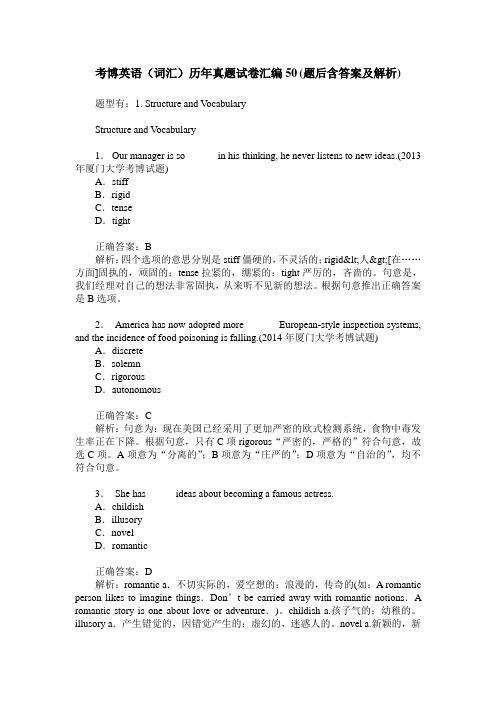
考博英语(词汇)历年真题试卷汇编50(题后含答案及解析)题型有:1. Structure and V ocabularyStructure and V ocabulary1.Our manager is so______ in his thinking, he never listens to new ideas.(2013年厦门大学考博试题)A.stiffB.rigidC.tenseD.tight正确答案:B解析:四个选项的意思分别是stiff僵硬的,不灵活的;rigid<人>[在……方面]固执的,顽固的;tense拉紧的,绷紧的:tight严厉的,吝啬的。
句意是,我们经理对自己的想法非常固执,从来听不见新的想法。
根据句意推出正确答案是B选项。
2.America has now adopted more ______ European-style inspection systems, and the incidence of food poisoning is falling.(2014年厦门大学考博试题) A.discreteB.solemnC.rigorousD.autonomous正确答案:C解析:句意为:现在美国已经采用了更加严密的欧式检测系统,食物中毒发生率正在下降。
根据句意,只有C项rigorous“严密的,严格的”符合句意,故选C项。
A项意为“分离的”;B项意为“庄严的”;D项意为“自治的”,均不符合句意。
3.She has______ideas about becoming a famous actress.A.childishB.illusoryC.novelD.romantic正确答案:D解析:romantic a.不切实际的,爱空想的;浪漫的,传奇的(如:A romantic person likes to imagine things.Don’t be carried away with romantic notions.A romantic story is one about love or adventure.)。
厦门大学 厦大 2005年写作与英汉互译 考研真题及答案解析

厦门大学2005年招收攻读硕士学位研究生入学考试试题招生专业: 英语语言文学 考试科目及代码:写作与英汉互译 319研究方向:_________________注意:答案必须标明题号,按序写在专用答题纸上,写在本试卷上或草稿纸上者一律不给分。
I.Translate the following two passages into Chinese. (35 points) (45 min.)Passage 1Without union(联邦)our independence and liberty would never have been achieved; without union they never can be maintained. Divided into twenty-four, or even a smaller number, of separate communities, we shall see our internal trade burdened with numberless restraints and exactions; communication between distant points and sections obstructed or cut off; our sons made soldiers to deluge with blood the fields they now till in peace; the mass of our people borne down and impoverished by taxes to support armies and navies, and military leaders at the head of their victorious legions becoming our lawgivers and judges. The loss of liberty, of all good government, of peace, plenty, and happiness, must inevitably follow a dissolution of the Union. In supporting it, therefore, we support all that is dear to the freeman and the philanthropist.Passage 2Only those who have not studied history lose heart in great reforms; only those unread in the biography of genius imagine themselves to be original. Except in the realm of material invention, there is nothing new under the sun. There is no reform which some great soul has not dreamed of centuries ago; there is not a doctrine that some father of the Church did not set forth. The Greek philosophers and early Christian Fathers boxed the compass once for all; we may take our choice of what they have left on record. Let us then learn a wise humility, but at the same time a humble wisdom, as we remember that there are but two classes of men—one which declares that our times are the worst the world has seen, and another which claims our times as best—and he who claims this, all revelation, all science, all history witnesses is right and will be right forevermore.II.Translate the following two passages into English. (40 points) (45 min.)Passage 1不可否认,鼓浪屿是一个秀丽的风景区,但它还是一个有独特历史文化素养的地方,这些中西合壁的历史文化需要有人去传承、它的现在和将来都需要有人去建设,去发扬光大,而所有这一切,无不有赖于居住在岛上的“鼓浪屿人”去完成。
考博英语(词汇)历年真题试卷汇编26(题后含答案及解析)
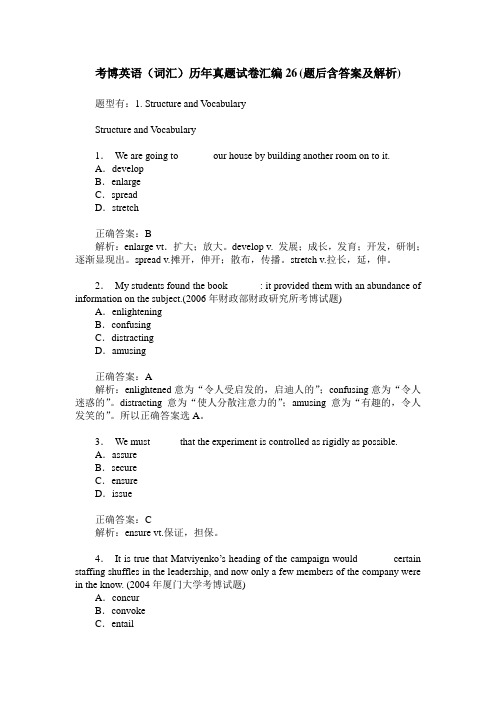
考博英语(词汇)历年真题试卷汇编26(题后含答案及解析)题型有:1. Structure and V ocabularyStructure and V ocabulary1.We are going to ______ our house by building another room on to it.A.developB.enlargeC.spreadD.stretch正确答案:B解析:enlarge vt.扩大;放大。
develop v. 发展;成长,发育;开发,研制;逐渐显现出。
spread v.摊开,伸开;散布,传播。
stretch v.拉长,延,伸。
2.My students found the book ______: it provided them with an abundance of information on the subject.(2006年财政部财政研究所考博试题)A.enlighteningB.confusingC.distractingD.amusing正确答案:A解析:enlightened意为“令人受启发的,启迪人的”;confusing意为“令人迷惑的”。
distracting意为“使人分散注意力的”;amusing意为“有趣的,令人发笑的”。
所以正确答案选A。
3.We must______that the experiment is controlled as rigidly as possible.A.assureB.secureC.ensureD.issue正确答案:C解析:ensure vt.保证,担保。
4.It is true that Matviyenko’s heading of the campaign would ______ certain staffing shuffles in the leadership, and now only a few members of the company were in the know. (2004年厦门大学考博试题)A.concurB.convokeC.entailD.alternate正确答案:C解析:本题空格处是说Matviyenko领导这场战役将会需要一定的人员变动。
2008年厦门大学考博英语真题及详解【圣才出品】
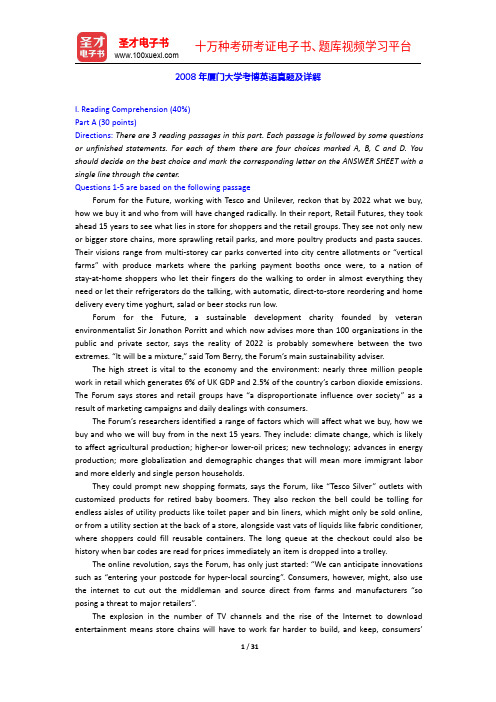
2008年厦门大学考博英语真题及详解I.Reading Comprehension(40%)Part A(30points)Directions:There are3reading passages in this part.Each passage is followed by some questions or unfinished statements.For each of them there are four choices marked A,B,C and D.You should decide on the best choice and mark the corresponding letter on the ANSWER SHEET with a single line through the center.Questions1-5are based on the following passageForum for the Future,working with Tesco and Unilever,reckon that by2022what we buy, how we buy it and who from will have changed radically.In their report,Retail Futures,they took ahead15years to see what lies in store for shoppers and the retail groups.They see not only new or bigger store chains,more sprawling retail parks,and more poultry products and pasta sauces. Their visions range from multi-storey car parks converted into city centre allotments or“vertical farms”with produce markets where the parking payment booths once were,to a nation of stay-at-home shoppers who let their fingers do the walking to order in almost everything they need or let their refrigerators do the talking,with automatic,direct-to-store reordering and home delivery every time yoghurt,salad or beer stocks run low.Forum for the Future,a sustainable development charity founded by veteran environmentalist Sir Jonathon Porritt and which now advises more than100organizations in the public and private sector,says the reality of2022is probably somewhere between the two extremes.“It will be a mixture,”said Tom Berry,the Forum’s main sustainability adviser.The high street is vital to the economy and the environment:nearly three million people work in retail which generates6%of UK GDP and2.5%of the country’s carbon dioxide emissions. The Forum says stores and retail groups have“a disproportionate influence over society”as a result of marketing campaigns and daily dealings with consumers.The Forum’s researchers identified a range of factors which will affect what we buy,how we buy and who we will buy from in the next15years.They include:climate change,which is likely to affect agricultural production;higher-or lower-oil prices;new technology;advances in energy production;more globalization and demographic changes that will mean more immigrant labor and more elderly and single person households.They could prompt new shopping formats,says the Forum,like“Tesco Silver”outlets with customized products for retired baby boomers.They also reckon the bell could be tolling for endless aisles of utility products like toilet paper and bin liners,which might only be sold online, or from a utility section at the back of a store,alongside vast vats of liquids like fabric conditioner, where shoppers could fill reusable containers.The long queue at the checkout could also be history when bar codes are read for prices immediately an item is dropped into a trolley.The online revolution,says the Forum,has only just started:“We can anticipate innovations such as“entering your postcode for hyper-local sourcing”.Consumers,however,might,also use the internet to cut out the middleman and source direct from farms and manufacturers“so posing a threat to major retailers”.The explosion in the number of TV channels and the rise of the Internet to download entertainment means store chains will have to work far harder to build,and keep,consumers’One retailer told the researchers:“We won’t be able to rely on hitting millions of people at 7.45pm on a Wednesday night with a Coronation Street advertising slot”.The Forum came up with four-different visions of the future depending on high or low economic growth and changing consumer outlooks;whether shoppers want more convenience or to do more for themselves;perhaps buying more locally sourced products with more information about what their families are eating and wearing.1.What does the passage mainly talk about?A.The big retailers and experts have forecast an individualistic,optimistic society wheretechnology is held in very high regards.B.The big retailers and experts have gazed into the future and seen a new world of shopping.C.The big retailers and experts have recognized that the economy is buoyant and big businesswill met shoppers’demands.D.The big retailers and experts have predicted that consumer confidence will be low andpeople rely on big business for security.2.Which of the following behaviors has been carried out by Forum for the Future according to the passage?A.It provides methods for consumers to measure their energy use and carbon emission.B.It promotes campaigns for the big retailers to build up consumer confidence.C.It provides counsels for some public and private organizations.D.It predicts that the big retailers would become more powerful in2022.3.According to the report,the shopping scenario for shoppers and retailers in15years time will include the followings,except______.A.vertical farmsB.orders from home refrigeratorsC.home deliveryD.fingers doing the walking4.Which of the following aspects has influence on people’s shopping behaviors according to theresearchers?A.The changes of the population.B.The emission of the country’s carbon dioxide.C.The emerging of the baby boomers.D.The rearrangement at the back of the stores.5.When the Forum advances four kinds of future consumption,the condition not taken intoconsideration is______.A.smart package productsB.purchasing more local productsC.economic growthD.consumers perspectives【答案与解析】1.B文章第一段Forum for the Future预测到2022年what we buy,how we buy it and whofrom will have changed radically.可知Forum for the Future预测的是将来人们shopping 的情况。
厦门大学考博英语模拟试卷15(题后含答案及解析)
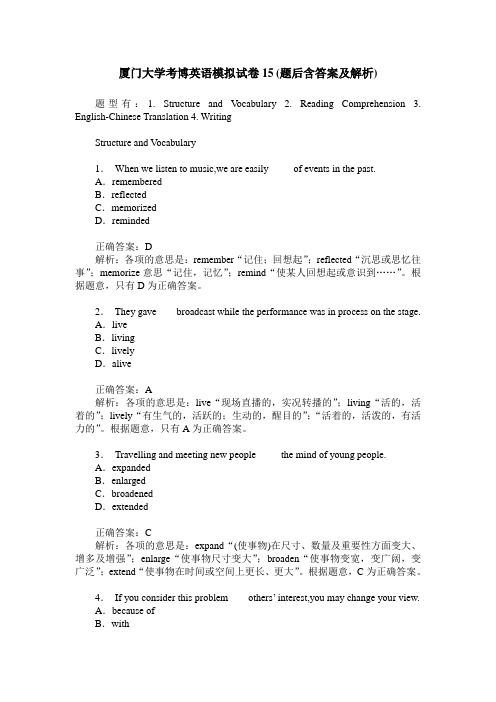
厦门大学考博英语模拟试卷15(题后含答案及解析)题型有:1. Structure and V ocabulary 2. Reading Comprehension 3. English-Chinese Translation 4. WritingStructure and V ocabulary1.When we listen to music,we are easily_____of events in the past.A.rememberedB.reflectedC.memorizedD.reminded正确答案:D解析:各项的意思是:remember“记住;回想起”;reflected“沉思或思忆往事”;memorize意思“记住,记忆”;remind“使某人回想起或意识到……”。
根据题意,只有D为正确答案。
2.They gave____broadcast while the performance was in process on the stage.A.liveB.livingC.livelyD.alive正确答案:A解析:各项的意思是:live“现场直播的,实况转播的”;living“活的,活着的”;lively“有生气的,活跃的;生动的,醒目的”;“活着的,活泼的,有活力的”。
根据题意,只有A为正确答案。
3.Travelling and meeting new people_____the mind of young people.A.expandedB.enlargedC.broadenedD.extended正确答案:C解析:各项的意思是:expand“(使事物)在尺寸、数量及重要性方面变大、增多及增强”;enlarge“使事物尺寸变大”;broaden“使事物变宽,变广阔,变广泛”;extend“使事物在时间或空间上更长、更大”。
根据题意,C为正确答案。
4.If you consider this problem____others’ interest,you may change your view.A.because ofB.withD.according to正确答案:D解析:各项的意思是:because of“因为”;with“和……一起;具有;对于”;due to意为“由于”;according to“根据,按照”。
考博英语(语法)历年真题试卷汇编4(题后含答案及解析)
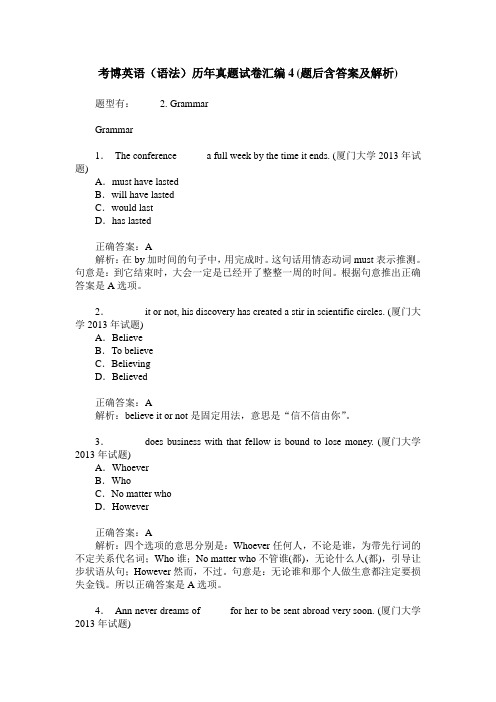
考博英语(语法)历年真题试卷汇编4(题后含答案及解析)题型有: 2. GrammarGrammar1.The conference______a full week by the time it ends. (厦门大学2013年试题)A.must have lastedB.will have lastedC.would lastD.has lasted正确答案:A解析:在by加时间的句子中,用完成时。
这句话用情态动词must表示推测。
句意是:到它结束时,大会一定是已经开了整整一周的时间。
根据句意推出正确答案是A选项。
2.______it or not, his discovery has created a stir in scientific circles. (厦门大学2013年试题)A.BelieveB.To believeC.BelievingD.Believed正确答案:A解析:believe it or not是固定用法,意思是“信不信由你”。
3.______does business with that fellow is bound to lose money. (厦门大学2013年试题)A.WhoeverB.WhoC.No matter whoD.However正确答案:A解析:四个选项的意思分别是:Whoever任何人,不论是谁,为带先行词的不定关系代名词;Who谁;No matter who不管谁(都),无论什么人(都),引导让步状语从句;However然而,不过。
句意是:无论谁和那个人做生意都注定要损失金钱。
所以正确答案是A选项。
4.Ann never dreams of______for her to be sent abroad very soon. (厦门大学2013年试题)A.there being a chanceB.there to be a chanceC.there be a chanceD.being a chance正确答案:A解析:there be句型充当dream of的宾语,由于of为介词,be动词变成being。
厦门大学考博英语模拟试卷1(题后含答案及解析)
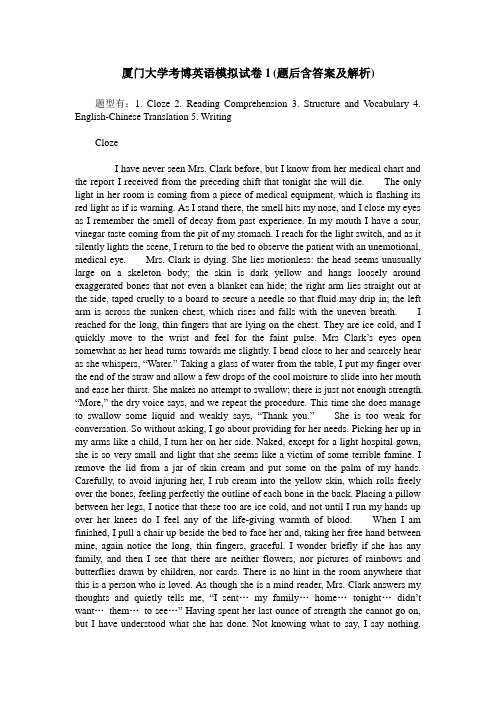
厦门大学考博英语模拟试卷1(题后含答案及解析)题型有:1. Cloze 2. Reading Comprehension 3. Structure and V ocabulary 4. English-Chinese Translation 5. WritingClozeI have never seen Mrs. Clark before, but I know from her medical chart and the report I received from the preceding shift that tonight she will die. The only light in her room is coming from a piece of medical equipment, which is flashing its red light as if is warning. As I stand there, the smell hits my nose, and I close my eyes as I remember the smell of decay from past experience. In my mouth I have a sour, vinegar taste coming from the pit of my stomach. I reach for the light switch, and as it silently lights the scene, I return to the bed to observe the patient with an unemotional, medical eye. Mrs. Clark is dying. She lies motionless: the head seems unusually large on a skeleton body; the skin is dark yellow and hangs loosely around exaggerated bones that not even a blanket can hide; the right arm lies straight out at the side, taped cruelly to a board to secure a needle so that fluid may drip in; the left arm is across the sunken chest, which rises and falls with the uneven breath. I reached for the long, thin fingers that are lying on the chest. They are ice cold, and I quickly move to the wrist and feel for the faint pulse. Mrs Clark’s eyes open somewhat as her head turns towards me slightly. I bend close to her and scarcely hear as she whispers, “Water.” Taking a glass of water from the table, I put my finger over the end of the straw and allow a few drops of the cool moisture to slide into her mouth and ease her thirst. She makes no attempt to swallow; there is just not enough strength. “More,” the dry voice says, and we repeat the procedure. This time she does manage to swallow some liquid and weakly says, “Thank you.”She is too weak for conversation. So without asking, I go about providing for her needs. Picking her up in my arms like a child, I turn her on her side. Naked, except for a light hospital gown, she is so very small and light that she seems like a victim of some terrible famine. I remove the lid from a jar of skin cream and put some on the palm of my hands. Carefully, to avoid injuring her, I rub cream into the yellow skin, which rolls freely over the bones, feeling perfectly the outline of each bone in the back. Placing a pillow between her legs, I notice that these too are ice cold, and not until I run my hands up over her knees do I feel any of the life-giving warmth of blood. When I am finished, I pull a chair up beside the bed to face her and, taking her free hand between mine, again notice the long, thin fingers, graceful. I wonder briefly if she has any family, and then I see that there are neither flowers, nor pictures of rainbows and butterflies drawn by children, nor cards. There is no hint in the room anywhere that this is a person who is loved. As though she is a mind reader, Mrs. Clark answers my thoughts and quietly tells me, “I sent…my family…home…tonight…didn’t want…them…to see…” Having spent her last ounce of strength she cannot go on, but I have understood what she has done. Not knowing what to say, I say nothing.Again she seems to sense my thoughts, “You…stay…”Time seems to stand still. In the total silence, I feel my own pulse quicken and hear my breathing as it begins to match hers, breath for uneven breath. Our eyes meet and somehow, together, we become aware that this is a special moment between two human beings…Her long fingers curl easily around my hands and I nod my head slowly, smiling. Without words, through yellowed eyes, I receive my thank you and her eyes slowly close. Some unknown interval of time passes before her eyes open again, only this time there is no response in them, just a blank stare. Without warning, her shallow breathing stops, and within a few moments, the faint pulse is also gone. One single tear flows from her left eye, across the cheek and down onto the pillow. I begin to cry quietly. There is a swell of emotion within me for this stranger who so quickly came into and went from my life. Her suffering is done, yet so is the life. Slowly, still holding her hand, I become aware that I do not mind this emotional battle that in fact, it was a privilege she has allowed me, and I would do it again, gladly. Mrs. Clark spared her family an episode that perhaps they were not equipped to handle and instead shared it with me. She had not wanted to have her family see her die, yet she did not want to die alone. No one should die alone, and I am glad I was there for her. Two days later, I read about Mrs. Clark in the newspaper. She was the mother of seven, grandmother of eighteen, an active member of her church, a leader of volunteer associations in her community, a concert piano player, and a piano teacher for over thirty years.Yes, they were long and graceful fingers. A drip K liquid B secured L famine C decay M jar D preceding N slide E straw O thirst F faint P fluid G pit Q moisture H chart R loosely I palm S hit J lid T indication The medical【1】from the 【2】shift was the first【3】I got that Mrs. Clark would die. There was also a smell of 【4】in the room that【5】me in the【6】of my stomach. The patient’s skin hung【7】so a needle was【8】to let the【9】【10】in. She had a 【11】pulse and was thirsty, so I gave her a 【12】of a few drops of 【13】to 【14】into her mouth to ease her 【15】. Having managed to swallow some 【16】, she said “Thank you.” She was so small and light that she looked like a victim of some terrible 【17】. I removed the 【18】of a 【19】of cream and put some on the 【20】of my hand. Then I rubbed the cream into her yellow skin to make her feel better.1.正确答案:H2.正确答案:D3.正确答案:T 4.正确答案:C 5.正确答案:S 6.正确答案:G 7.正确答案:R 8.正确答案:B 9.正确答案:P 10.正确答案:A 11.正确答案:F 12.正确答案:E 13.正确答案:Q 14.正确答案:N15.正确答案:O16.正确答案:K17.正确答案:L18.正确答案:J19.正确答案:M20.正确答案:IReading ComprehensionThe main idea of these business—school academics is appealing. In a word where companies must adapt to new technologies and source of competition, it is much harder than it used to be to offer good employees job security and an opportunity to climb the corporate ladder. Yet it is also more necessary than ever for employees to invest in better skills and sparkle with bright ideas. How can firms get the most out of people if they can no longer offer them protection and promotion? Many bosses would love to have an answer. Sumantrra Ghoshal of the London Business School and Christopher Bartlett of the Harvard Business School think they have one: “Employability.” If managers offer the right kinds of training and guidance, and change their attitude towards their underlings, they will be able to reassure their employees that they will always have the skills and experience to find a good job—even if it is with a different company. Unfortunately, they promise more than they deliver. Their thoughts on what an ideal organization should accomplish are hard to quarrel with: encourage people to be creative, make sure the gains from creativity are shared with the pains of the business that can make the most of them, keep theorganization from getting stale and so forth. The real disappointment comes when they attempt to show how firms might actually create such an environment. At its hub is the notion that companies can attain their elusive goals by changing their implicit contract with individual workers, and treating them as a source of value rather than a cog in a machine. The authors offer a few inspiring example of companies—they include Motorola, 3M and ABB—that have managed to go some way towards creating such organizations. But they offer little useful guidance on how to go about it, and leave the biggest questions unanswered. How do you continuously train people, without diverting them from their everyday job of making the business more profitable? How do you train people to be successful elsewhere while still encouraging them to make big commitments to your own firm? How do you get your newly liberated employees to spend their time on ideas that create value, and not simply on those they enjoy? Most of their answers are platitudinous, and when they are not they are unconvincing.21.We can infer from the passage that in the past an employee______.A.had job security and opportunity of promotionB.had to compete with each other to keep his jobC.had to undergo training all the timeD.had no difficulty climbing the corporate ladder正确答案:A解析:从第1段的句子可以看出,过去一个好的职员很容易获得事业保险(job security )和晋升的机会(opportunity to climb the corporate ladder)。
考博英语(词汇)历年真题试卷汇编55(题后含答案及解析)
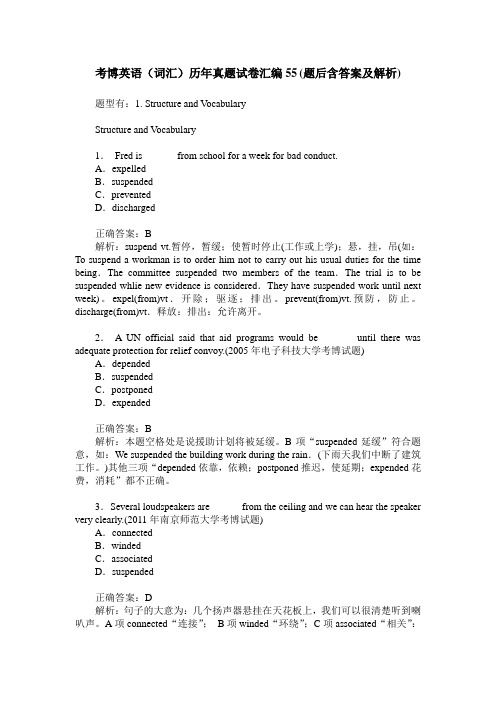
考博英语(词汇)历年真题试卷汇编55(题后含答案及解析)题型有:1. Structure and V ocabularyStructure and V ocabulary1.Fred is ______ from school for a week for bad conduct.A.expelledB.suspendedC.preventedD.discharged正确答案:B解析:suspend vt.暂停,暂缓;使暂时停止(工作或上学);悬,挂,吊(如:To suspend a workman is to order him not to carry out his usual duties for the time being.The committee suspended two members of the team.The trial is to be suspended whlie new evidence is considered.They have suspended work until next week)。
expel(from)vt.开除;驱逐;排出。
prevent(from)vt.预防,防止。
discharge(from)vt.释放:排出:允许离开。
2.A UN official said that aid programs would be ______ until there was adequate protection for relief convoy.(2005年电子科技大学考博试题) A.dependedB.suspendedC.postponedD.expended正确答案:B解析:本题空格处是说援助计划将被延缓。
B项“suspended延缓”符合题意,如:We suspended the building work during the rain.(下雨天我们中断了建筑工作。
[考研类试卷]2012年厦门大学英语专业(英美文学)真题试卷.doc
![[考研类试卷]2012年厦门大学英语专业(英美文学)真题试卷.doc](https://img.taocdn.com/s3/m/c6cba05c6bd97f192379e90f.png)
[考研类试卷]2012年厦门大学英语专业(英美文学)真题试卷一、匹配题0 Match the authors or poets in Column I with the literary trends in Column II.(8 points)1)Modernism2)Imagism3)Romanticism4)Transcendentalism5)Pre-romanticism6)Realism7)Post-modernism8)Neo-classicism1 Henry David Thoreau2 George Gordon Byron3 Joseph Conrad4 Thomas Pynchon5 Amy Lowell6 Henry Fielding7 Henry James8 Thomas Gray二、名词解释9 Allegory10 avant-garde11 ballad12 Black Mountain poets13 Bloomsbury Group14 Eco-criticism三、评论题15 Pecola Breedlove(from: The Bluest Eye)16 Frederic Henry(from: A Farewell to Arms)17 Emma Woodhouse(from; Emma)18 Pip(from: Great Expectations)19 Yossarian(from; Catch-22)20 Quentin Compson(from; The Sound and the Fury)四、问答题21 The first half of the 18th century is called the Age of Pope. Why?22 Sinclair Lewis is the first American writer who got the Nobel Prize for Literature. Why do you think he deserve the prize?五、分析题23 Read the following poem and write a short essay based on the following questions in about 100 words.(8 points)I'm nobody by Emily Dickinson(1830 - 1886)I'm nobody, Who are you?Are you nobody too?Then there's a pair of us.Don't tell—they'd banish us, you know.How dreary to be somebody!How public—like a frog—To tell your name the livelong JuneTo an admiring bog.What, in your opinion is the theme of this poem?What is the meaning of each stanza? What is your attitude towards fame?。
2005医博统考听力题解析原文
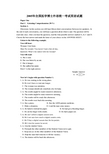
2005年全国医学博士外语统一考试英语试题Paper OnePart I Listening Comprehension (30 %)Section ADirections: In this section you will hear fifteen short conversations between two speakers. At the end of each conversation, you will hear a question about what is said. The question will be read only once. After you hear the question, read the four possible answers marked A, B, C and D. Choose the best answer and mark the letter of your choice on the ANSWER SHEET.Listen to the following example.You will hear:Woman: I feel faint.Man: No wonder. You haven’t had a bite all day,Question: What’s the matter with the woman?You will read:A. She is sick.B. She was bitten by an ant.C. She is hungry.D. She spilled her paint.Here C is the right answer.Sample 3answerA DNow let’s begin with question Number 1.1. A. He was waiting in the wrong place.B. He won’t have to wait any longer.C. The woman was mistaken.D. The woman should ask somebody else for help.2. A. The results might be ready tomorrow afternoon.B. The results might be ready tomorrow morning,C. The results will be ready this afternoon.D. The results were back this morning.3. A. Buy a purse. B. Buy the AIDS patients medicine.C. Make a donation.D. Lend the man some money.4. A. He failed to defend his paper. B. He had got a bleeding finger.C. He cut his finger with a knife.D. He had a paper cut.5. A. He can’t afford a digital camera now.B. He’s not sure how much a digital camera costs.C. He’ll buy a digital camera that fits his pocket.D. He’s lost the money he saved.6. A. Join the student Union.B. Persuade the other members of the Student Union not to quit.C. Keep an eye on the other members of the Student Union.D. Help the man find someone to fill the vacancy.7. A. The dentist will be back this afternoon.B. The dentist will have a full schedule this afternoon.C. He’s already had the dentist check his teeth.D. He plans to see the dentist this afternoon.8. A. Large and bulky. B. Lightweight and compact.C. Fancy and sophisticated.D. Appealing and amazing.9. A Use less shampoo, B. Stop using shampoo.C. Switch to the man’s brand.D. Rinse off the shampoo thoroughly.10. A. The fitness center doesn’t open until tomorrow.B. She is too busy to go to the fitness center.C. The fitness center is not for kids.D. The project of the fitness center will be finished tomorrow.11. A. Look in the library catalogue.B. Borrow the man’s computer.C. Seek the information from the Internet.D. Seek the information from Drama Society.12. A. He has changed his schedule. B. He was sick last Monday.C. He works less than he used to.D. He started his vacation last Monday.13. A. Because she has to pay a home visit to an emergency case.B. Because she dislikes teaching and wants to quit.C. Because her father has just been sent to the hospital and needs her care.D. Because her father is leaving the hospital and needs her help.14. A. Discontinue all the medications.B. Try new medicine and then have a CT scan.C. Take a CT scan before medication.D. Have a CT scan right away.15. A. Annoyed. B. Scared. C. Puzzled. D. Anxious.Section BDirections: In this section you will hear three passages. After each one, you will hear five questions. After each question, read the four possible answers marked A, B, C and D, Choose the best answer and mark the letter of your choice on the ANSWER SHEET.Passages One16. A. Common insomnia. B. Sleep-including activities.C. Foods to help people sleep better.D. Causes of insomnia and ways to deal with it.17. A. Asthma. B. Aches. C. Ulcer. D. Anemia.18. A. Go to bed earlier the next night. B. Go to bed as usual the next night.C. Take a nap the next day.D. Sleep late the next few days.19. A. Because tryptophan can balance their diet.B. Because tryptophan is an amino acid found in certain foods.C. Because tryptophan is crucial to the sleep process.D. Because tryptophan can cure insomnia altogether.20. A. Pessimistic. B. Optimistic. C. Doubtful. D. Indifferent.Passage Two21. A. The difference between the couple in their view of time.B. The difference between the couple in their view of religion.C. The difference between the couple in their view of loyalty.D. The difference between the couple in their view of responsibility.22. A. He likes to be late. B. He likes to be early.C. He likes to be just on time.D. He likes to be just in time.23. A. 2 pm. B. 1:40 pm. C. 2:03 pm. D. 2:30 pm.24. A. Cancel the wedding immediately. B. Find a substitute immediately.C. Wait patiently till the groom to come finally.D. Find a lawyer to sue the groom.25. A. Cultural difference. B. Gender-related difference.C. Ethnical difference.D. Social rank.Passage Three26. A. She is a dentist. B. She is an orthopedist.C. She is a physiotherapist.D. She is a pharmacist.27. A. She is examining the man.B. She is taking a history.C. She is explaining the man’s condition.D. She is discussing a case with her colleague.28. A. Sliding over the stairs. B. Straightening his spine.C. Bending his knee too hard.D. Lifting heavy loads in the wrong way.29. A. In the lower part of his back. B. In the upper part of his back.C. In the middle part of his back.D. Not mentioned.30. A. Stay in bed to let the disc rest. B. Take some drugs to relieve the pain.C. Have some physiotherapy.D. Undergo an operation right away.2005全国医学博士外语统一考试英语试题参考答案及解析Paper OnePart ⅠListening Comprehension(30%)Section A1. C 通过男士的话You must be thinking of someone else可知女士是认错人了。
考博英语词汇历年真题试卷汇编46_真题(含答案与解析)-交互
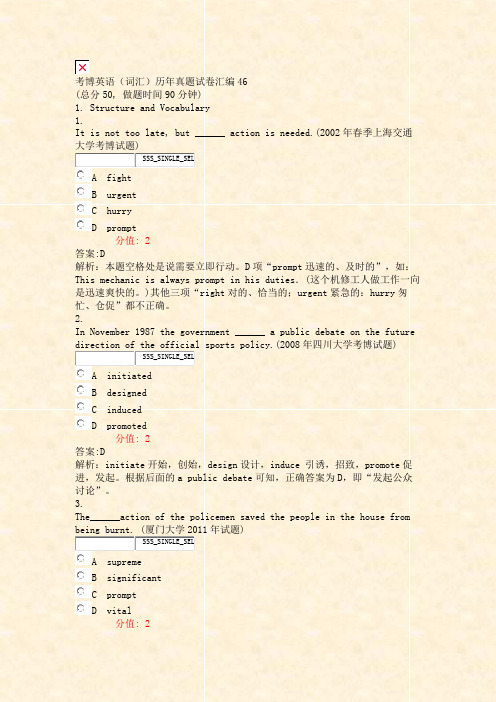
考博英语(词汇)历年真题试卷汇编46(总分50, 做题时间90分钟)1. Structure and Vocabulary1.It is not too late, but ______ action is needed.(2002年春季上海交通大学考博试题)SSS_SINGLE_SELA fightB urgentC hurryD prompt分值: 2答案:D解析:本题空格处是说需要立即行动。
D项“prompt迅速的、及时的”,如:This mechanic is always prompt in his duties.(这个机修工人做工作一向是迅速爽快的。
)其他三项“right对的、恰当的;urgent紧急的:hurry匆忙、仓促”都不正确。
2.In November 1987 the government ______ a public debate on the future direction of the official sports policy.(2008年四川大学考博试题) SSS_SINGLE_SELA initiatedB designedC inducedD promoted分值: 2答案:D解析:initiate开始,创始,design设计,induce 引诱,招致,promote促进,发起。
根据后面的a public debate可知,正确答案为D,即“发起公众讨论”。
3.The______action of the policemen saved the people in the house from being burnt. (厦门大学2011年试题)SSS_SINGLE_SELA supremeB significantC promptD vital分值: 2答案:C解析:句子的大意为:警察迅速的行动救了房子中的人,使他们免受烧伤。
A项supreme“最高的,至高的,最重要的”;B项significant“重大的,有效的,有意义的”;C项prompt“及时的,迅速的,敏捷的”:D项vital“至关重要的,生死攸关的,有活力的”。
